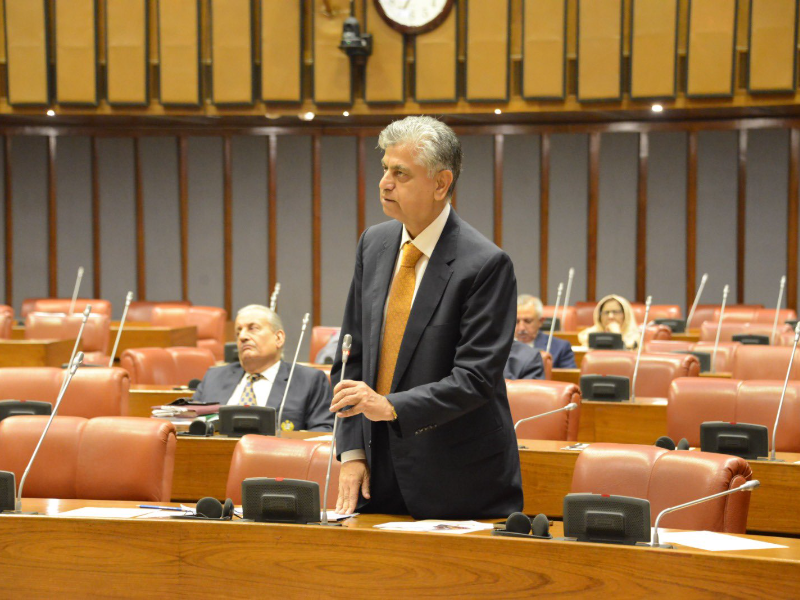With the next general elections hardly a month away, the Senate passed a resolution on Friday seeking a delay in elections citing security concerns.
The resolution, presented by independent Senator Dilawar Khan, was opposed by Caretaker Information Minister Murtaza Solangi and Pakistan Muslim League-Nawaz (PML-N) Senator Afnan Ullah Khan.
The upper house of parliament has a total of 100 members, out of which a mere 14 were present during today’s session.
The resolution read that, “The Constitution of Pakistan upholds the right to vote for every citizen of Pakistan. The Constitutional duty assigned to the Election Commission of Pakistan to conduct free and fair elections is contingent upon inclusivity and ensuring the participation of all regions and people,” it maintained, adding that the “voter turnout in colder areas remains notably high during moderate weather conditions”.
The resolution maintained that Balochistan and Khyber-Pakhtunkhwa experience severe weather conditions during the months of January and February. “Various groups and political parties have expressed significant reservations regarding anticipated difficulties in ensuring the participation of residents in cold areas during the electioneering process,” the Senate resolution maintained.
Furthermore, the resolution noted with “great concern” that, “Recent incidents, including the foiled attempts on the lives of Jamiat Ulema-e- Islam-Fazl (JUI-F) Chief Maulana Fazlur Rehman and former MNA Mr. Mohsin Dawar, as well as threatening calls targeting Awami National Party’s Provincial Chief Mr. Aimal Wali Khan and other political figures, have raised concerns about the safety of political leaders.”

“The Ministry of Interior has conveyed serious threats to the lives of prominent politicians, further exacerbating the challenges faced by political parties in exercising their right to free and fair election campaigning;
“There has been a marked Increase in attacks on security forces and citizens claiming precious lives particularly in northwestern Khyber Pakhtunkhwa and Balochistan Provinces. The intelligence agencies have warned of militant attack threats on election rallies in the two provinces,” the resolution stated.
‘Elections held in similar conditions’
Rejecting the resolution right after it was passed, PML-N Senator Afnanullah, acknowledged that the security situation in the country was not good however, he said the conditions were worse in 2008 and 2013, yet elections were held in both years.
He dismissed the ‘pretexts’, as “boot polish”. “Will you delay elections on the pretext of weather and security?” he asked. “Why didn’t you say these things in 2008 and 2013? I want to keep this forward on record that general elections were held twice in February,” the senator said.
The senator questioned the feasibility of running a country with 24 billion people without constitutional institutions and questioned whether there was a desire to eliminate the parliamentary system.
He suggested that some individuals were pushing for election delays for personal gain. Simultaneously, independent Senator Hidayatullah Khan shared his experience of receiving threats, having filed nine first information reports in the past two weeks. He highlighted recent incidents, including a bomb blast targeting a JUI-F candidate and the distribution of Daesh pamphlets in Bajaur district.
Hidayatullah urged a comprehensive examination of the situation and questioned if any political party included anti-terrorism measures in their manifestos. He emphasized the importance of valuing the passed resolution, expressing the grim reality that the Baloch and Pakhtun communities were suffering without adequate attention.
Addressing Afnanullah, Hidayatullah emphasized the peaceful nature of his colleague’s area while urging consideration for regions where people are facing daily threats and challenges. Meanwhile, Balochistan Awami Party (BAP) Senator Manzoor Ahmed acknowledged the deteriorating security and economic conditions in Pakistan, particularly the recent surge in terrorism in KP.
Ahmed, citing the killing of six barbers in North Waziristan, emphasized the challenging circumstances in Balochistan and KP, where people hesitate to leave their homes. Despite recognizing the need to address terrorism, he supported the resolution, suggesting that a delay in elections for six to eight months would not pose significant issues.
ECP dismisses resolution
In a statement released following the passing of the resolution, the Election Commission of Pakistan (ECP) maintained that nothing except the Supreme Court’s (SC) orders could alter the election schedule. The next general elections will be held on February 8, it added.
“The Senate resolution holds no value,” maintained the electoral watchdog.

